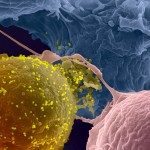Lien vers Pubmed [PMID] – 20038599
J. Exp. Med. 2010 Jan;207(1):39-49
The cytidine deaminase APOBEC3G (A3G) enzyme exerts an intrinsic anti-human immunodeficiency virus (HIV) defense by introducing lethal G-to-A hypermutations in the viral genome. The HIV-1 viral infectivity factor (Vif) protein triggers degradation of A3G and counteracts this antiviral effect. The impact of A3G on the adaptive cellular immune response has not been characterized. We examined whether A3G-edited defective viruses, which are known to express truncated or misfolded viral proteins, activate HIV-1-specific (HS) CD8+ cytotoxic T lymphocytes (CTLs). To this end, we compared the immunogenicity of cells infected with wild-type or Vif-deleted viruses in the presence or absence of the cytidine deaminase. The inhibitory effect of A3G on HIV replication was associated with a strong activation of cocultivated HS-CTLs. CTL activation was particularly marked with Vif-deleted HIV and with viruses harboring A3G. Enzymatically inactive A3G mutants failed to enhance CTL activation. We also engineered proviruses bearing premature stop codons in their genome as scars of A3G editing. These viruses were not infectious but potently activated HS-CTLs. Therefore, the pool of defective viruses generated by A3G represents an underestimated source of viral antigens. Our results reveal a novel function for A3G, acting not only as an intrinsic antiviral factor but also as an inducer of the adaptive immune system.

